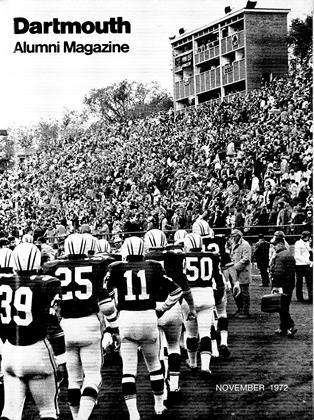When he made a 33-day visit to the People's Republic of China last spring, Jonathan Mirsky, Associate Professor of History and Chinese and Director of Dartmouth's East Asia Language and Area Studies Center, didn't expect to be listening to Hanover memories from the country's leading sociologist—but that was the surprising happening when he met Wu Wen-tsao '25. The photograph shows the two at Peking University's National Minorities Institute, where Professor Wu now teaches.
"When I mentioned that I was from Dartmouth College, I didn't expect that anyone would have heard of it," Professor Mirksy said. "Imagine my surprise when it turned out that Dr. Wu had spent four years here as an undergraduate. Like all Dartmouth men he appears to have total recall of the College and its surroundings, and his memories are typically enthusiastic. We conversed more or less privately for several hours, in Chinese and English— his is perfect—and I found that he is an ardent Chinese patriot who is proud of his country but retains plenty of friendly feeling for the U. S. which he expresses easily. Meeting him was one of the warmest personal experiences of my life, and Dartmouth made the match."
After Dartmouth, Professor Wu took his Ph.D. in sociology at Columbia University, under Franz Boas. He returned to China and eventually became Sociology chairman at Yenching, one of his country's great universities. His wife, Hsieh Ping-hsin, is one of China's foremost modern novelists.
Dr. Wu, 70 years old, had recently returned from planting cotton in central China when Professor Mirsky talked with him. Periods of work for even the most highly educated are part of Chairman Mao's cultural program. "Only now do I see the importance of regarding people as workers," Dr. Wu said. "By sharing their work I have become able to stop thinking of them as objects. At 70 I am beginning to remold myself."
Professor Mirsky was in China last spring as one of a group of American scholars invited there following President Nixon's visit. He lived in Asia from 1958 to 1961, taught in Taiwan in 1961-62, and had since made return trips to South Vietnam, Laos, and Thailand. Getting to mainland China was something he had been trying to accomplish for 17 years, he said when the invitation finally came. An account of his visit, "China After Nixon," appeared in The Annals of the AmericanAcademy of Political and Social Science, July 1972.
Prof. Jonathan Mirsky of Dartmouthwith Chinese scholar Wu Wen-tsao '25.
 View Full Issue
View Full Issue
More From This Issue
-
 Feature
FeatureFour Views of Educational Opportunity at Convocation Opening the 203rd Year
November 1972 -
 Feature
Feature1972 ANNUAL REPORT
November 1972 -
 Feature
FeatureElection '72: A Historian's View
November 1972 By JAMES E. WRIGHT -
 Feature
Feature"A Greater Feminine Presence"
November 1972 -
 Article
ArticleBig Green Teams
November 1972 -
 Article
ArticleFaculty
November 1972







